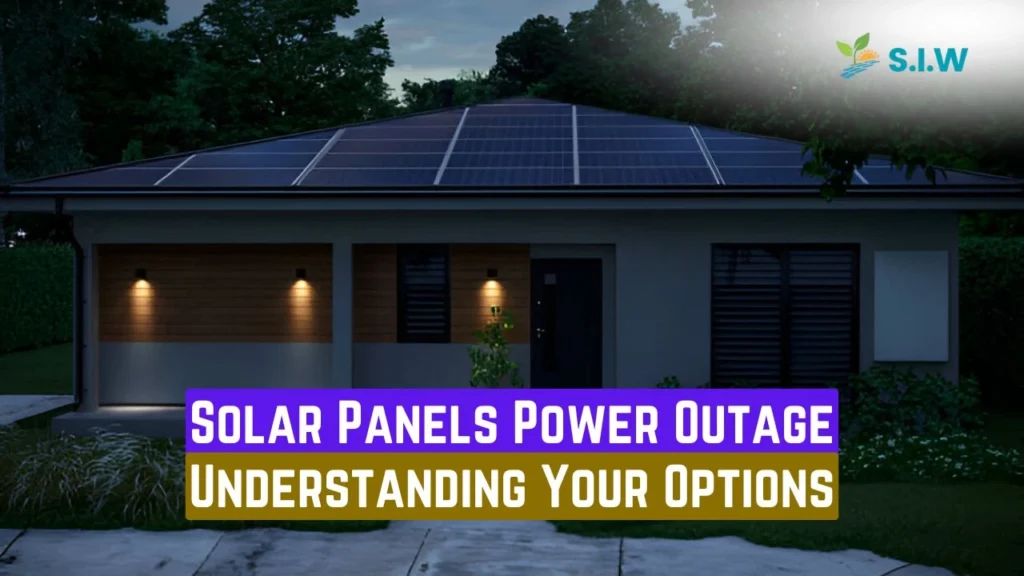Solar panels are a fantastic source of renewable energy, but when it comes to power outages, they may not always provide the safety net you expect. If you’re wondering whether solar panels can keep your home running during blackouts, the answer isn’t straightforward. There are a variety of factors that influence whether solar panels alone can help you through an outage, and more often than not, additional equipment is required.
In this guide, we’ll explore how solar panels function during power outages and dive deep into the options available to ensure that you have backup energy when you need it most. From hybrid solar systems to battery storage solutions, we’ll break down your best options for staying powered during a crisis.
How Solar Panels Work
At their core, solar panels convert sunlight into electrical energy, which can be used to power homes or businesses. This process occurs through photovoltaic (PV) cells, which absorb sunlight and generate direct current (DC) electricity. An inverter then converts this DC electricity into alternating current (AC), which is what most homes use. Typically, homes with solar panels remain connected to the grid, allowing them to sell excess power back to the utility company.
Solar Energy and Power Outages
So, can solar panels keep your home running during a power outage? In most cases, the answer is no—at least not without additional equipment. When grid-tied solar systems detect a power outage, they automatically shut down for safety reasons. This is to prevent electricity from flowing back into the grid, which could endanger utility workers attempting to restore power.
The Role of Inverters in Power Outages
In a traditional grid-tied system, inverters play a crucial role in converting the solar energy your panels produce. However, they also pose a challenge during outages. Since these inverters are programmed to shut down during blackouts, your solar panels stop providing energy until the grid is restored.
To continue using solar energy during outages, homeowners need to install special types of inverters, such as hybrid inverters, or invest in battery storage.
Battery Storage: A Game Changer
Batteries are an essential component of any solar power system designed to function during blackouts. With the right battery storage solution, you can store excess energy generated by your panels during the day and use it when the grid goes down. This allows your home to remain powered, even when your neighborhood is in the dark.
Types of Solar Battery Systems
When it comes to choosing a battery for your solar system, you’ll encounter a few main options:
- Lead-Acid Batteries: These are the most affordable option but offer a shorter lifespan and lower energy efficiency.
- Lithium-Ion Batteries: These are more expensive but last longer and have a higher energy density, making them a popular choice for homeowners looking to invest in solar storage.
- Flow Batteries: A less common but growing option, flow batteries have a long life span and are highly durable, although they come with a higher price tag.
Sizing Your Battery for Maximum Efficiency
One of the most important factors in ensuring your solar backup system can meet your needs is choosing the right size battery. This depends on your average energy consumption, the length of potential outages, and which appliances you want to prioritize. Calculating these factors correctly will help ensure that you aren’t left in the dark when an outage occurs.
Solar Generators as an Alternative
If a full battery system feels like too large of an investment, solar generators offer a portable alternative. These generators are powered by solar panels and can provide temporary relief during short outages. They’re ideal for powering essential appliances or devices during emergencies.
FAQs
Can solar panels work during a power outage?
No, most grid-tied solar panels will automatically shut down during a power outage unless paired with a battery backup or hybrid inverter system.
What’s the difference between a solar generator and battery storage?
Solar generators are portable and provide temporary power during short outages, while battery storage systems are built into your home and offer a more permanent, long-term solution.
Are battery backup systems expensive?
The cost of battery backup systems can vary, but while the initial investment may be high, the long-term benefits and potential savings on energy costs often justify the expense.
How long can a solar battery last during a power outage?
The duration of a solar battery backup depends on its size and your energy consumption. Larger batteries can last for several hours or even days, depending on how much power you’re using.
Do all solar systems need battery backup?
No, not all solar systems require a battery backup. However, if you want to remain powered during a blackout, adding a battery is essential.
What incentives are available for solar battery systems?
Many governments offer incentives and tax credits for homeowners who invest in solar systems with battery storage, making it more affordable to ensure backup power during outages.
Final Thoughts
Understanding your options for solar panels during a power outage is essential if you want to ensure uninterrupted power. Whether you opt for a hybrid system, battery storage, or a solar generator, these solutions can provide peace of mind and keep your home running smoothly when the grid goes down. By staying informed and investing in the right equipment, you can harness the full potential of solar energy—even in a blackout.








